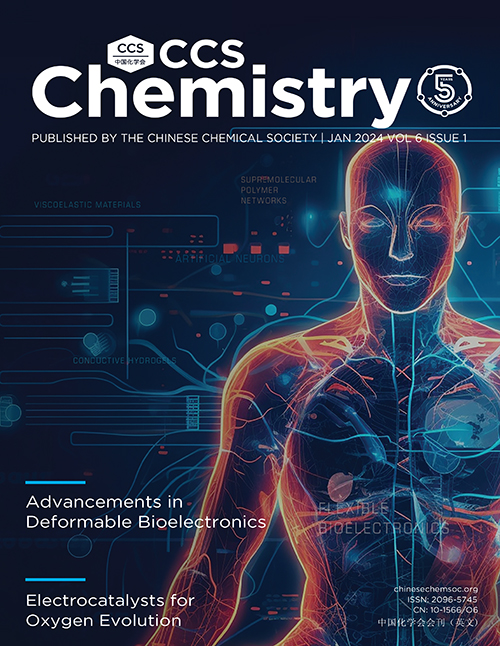A Quasi-Solid-State Electrolyte with Semi-Immobilized Solvent-Like Sites for Lithium-Metal Batteries
IF 9.2
1区 化学
Q1 CHEMISTRY, MULTIDISCIPLINARY
引用次数: 0
Abstract
Quasi solid-state lithium-metal batteries (QSSLMBs) hold significant promise for enhanced energy density when compared to conventional battery systems. Nevertheless, current QSSLMBs face challenges in lithium dendrites and electrode-electrolyte interfacial side reactions driven by excessive active free solvent molecules. Herein, a metal-organic framework (MOF) with chemically grafted soft multi-ether molecules (D-Gluconic acid,2,4:3,5-di-O-methylene-, denoted as G) has been proposed to serve as a solid-state electrolyte (SSE). The as-obtained MOF-G-based electrolyte (MGE) comprises structured MOF channels with semi-immobilized solvent-like sites (G molecules), which replace liquid molecules to coordinate with Li+ ions. The MGE reduces the demand for solvents compared with traditional QSSEs, thus suppressing interface side reactions. This arrangement also facilitates achieving an elevated Li+ transference number (0.64) and a broad electrochemical stability window (5.4 V). Ultimately, the solid-state Li//Li symmetrical battery displays an extended lifetime surpassing 1500 h under 1 mA cm−2. The solid-state LiFePO4//Li battery utilizing the flame retarded MGE attains an impressive capacity retention of 95.75% over 600 cycles. The MOF-based functionalization strategy introduces an innovative approach to designing high-performance SSE for the advanced solid-state LMBs.
- Download figure
- Download PowerPoint
用于锂金属电池的具有半固定溶剂位点的准固态电解质
与传统电池系统相比,准固态锂金属电池(QSSLMB)有望提高能量密度。然而,目前的准固态锂金属电池面临着锂枝晶和电极-电解质界面副反应的挑战,这些副反应是由过多的活性游离溶剂分子驱动的。在此,我们提出了一种具有化学接枝软多醚分子(D-葡萄糖酸,2,4:3,5-二-O-亚甲基,表示为 G)的金属有机框架 (MOF),以用作固态电解质 (SSE)。获得的基于 MOF-G 的电解质(MGE)由结构化的 MOF 通道和半固定化的溶剂型位点(G 分子)组成,G 分子取代液体分子与 Li+ 离子配位。与传统的 QSSE 相比,MGE 减少了对溶剂的需求,从而抑制了界面副反应。这种排列方式还有助于实现较高的 Li+ 转移数(0.64)和较宽的电化学稳定性窗口(5.4 V)。最终,固态锂/锂对称电池在 1 mA cm-2 下的使用寿命超过了 1500 小时。利用阻燃 MGE 的固态 LiFePO4/Li 电池在 600 次循环中的容量保持率高达 95.75%,令人印象深刻。基于 MOF 的功能化策略为先进的固态 LMB 引入了一种设计高性能 SSE 的创新方法。 下载图表下载 PowerPoint
本文章由计算机程序翻译,如有差异,请以英文原文为准。
求助全文
约1分钟内获得全文
求助全文
来源期刊

CCS Chemistry
Chemistry-General Chemistry
CiteScore
13.60
自引率
13.40%
发文量
475
审稿时长
10 weeks
期刊介绍:
CCS Chemistry, the flagship publication of the Chinese Chemical Society, stands as a leading international chemistry journal based in China. With a commitment to global outreach in both contributions and readership, the journal operates on a fully Open Access model, eliminating subscription fees for contributing authors. Issued monthly, all articles are published online promptly upon reaching final publishable form. Additionally, authors have the option to expedite the posting process through Immediate Online Accepted Article posting, making a PDF of their accepted article available online upon journal acceptance.
 求助内容:
求助内容: 应助结果提醒方式:
应助结果提醒方式:


